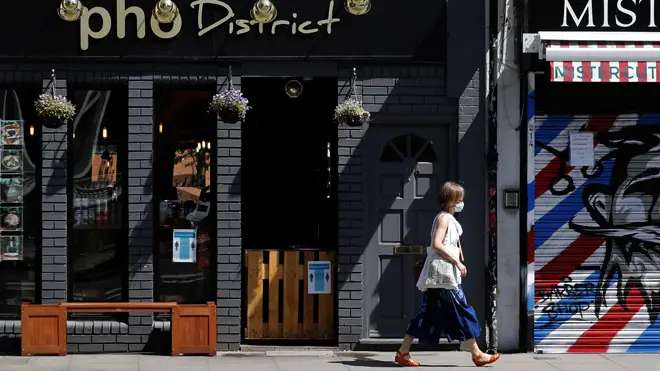
Ben Kentish 10pm - 1am
24 June 2020, 05:53

A group of the country's leading health experts has called for an urgent review to ensure Britain is properly prepared for the "real risk" of a second wave of coronavirus.
Ministers have been warned that urgent action is needed to prevent further loss of life and to protect the economy amid growing fears of a renewed outbreak over the winter.
The appeal is backed by the presidents of the Royal Colleges of Physicians, Surgeons, GPs and Nursing - as well as the chairman of the British Medical Association.
READ MORE: Explained: the changes to England's lockdown rules
READ MORE: UK adults spending more than a quarter of their time online in lockdown
Yesterday, the Prime Minister said the two-metre social-distancing rule would be replaced with a "one-metre plus" rule paving the way for pubs, restaurants, hotels and cinemas to begin reopening from July 4.

Pubs, Restaurants, Hotels & Hairdressers can reopen from 4th July
But in an open letter to the leaders of all the UK political parties published in the British Medical Journal, the health leaders call for a "rapid and forward-looking assessment" of the state of national preparedness in the event of a renewed flare-up.
"While the future shape of the pandemic in the UK is hard to predict, the available evidence indicates that local flare ups are increasingly likely and a second wave a real risk," they said.
"Many elements of the infrastructure needed to contain the virus are beginning to be put in place, but substantial challenges remain.
"The job now is not only to deal urgently with the wide-ranging impacts of the first phase of the pandemic, but to ensure that the country is adequately prepared to contain a second phase."
They called for the creation of a cross-party commission with a "constructive, non-partisan, four nations approach," to be established to develop practical recommendations for action based on what had been learned so far.
"We believe this will be essential if the UK is to get ahead of the curve," they said.
"We think there's a strong case for an immediate assessment of national preparedness, with the first results available no later than August, and that all its work should be completed by the end of October."
England's chief medical officer Professor Chris Whitty said at the final daily Covid-19 press conference yesterday: "I would be surprised and delighted if we weren't in this current situation through the winter and into next spring.
"I think then let's regroup and work out where we are.
"I expect there to be a significant amount of coronavirus circulating at least into that time and I think it is going to be quite optimistic that for science to come fully to the rescue over that kind of timeframe.
"But I have an absolute confidence in the capacity of science to overcome infectious diseases - it has done that repeatedly and it will do that for this virus, whether that is by drugs, vaccines or indeed other things that may come into play.
"For medium to long term, I'm optimistic. But for the short to medium term, until this time next year, certainly I think we should be planning for this for what I consider to be the long haul into 2021."
Ministers have already said that the temporary Nightingale Hospitals set up in case the NHS was overwhelmed by Covid-19 cases will remain on standby over the coming months.
The letter comes as Imperial College economist Professor David Miles told BBC Radio 5 the easing of lockdown measures was overdue.
He said: "We probably have gone past the point some weeks ago where the benefits of keeping in place the lockdown were large enough to match the rising and enormous costs of lockdown."
In other developments:
- The Government is providing £105 million to help prevent vulnerable people given emergency accommodation during the pandemic being returned to the streets.
- Labour is calling for NHS staff to undergo weekly testing for coronavirus in order to ensure waiting list backlogs can be safely cleared.
- First Minister Nicola Sturgeon has said the two-metre rule would remain in place in Scotland.
Announcing, the easing of the two-metre rule in England, Mr Johnson said the Government was taking a "cautious approach" and that ministers "will not hesitate to apply the brakes" in the event of an upsurge in the disease.
Listen & subscribe: Global Player | Apple Podcasts | Google Podcasts | Spotify
However at the final daily No 10 briefing, both the Government's chief scientific adviser Sir Patrick Vallance and Professor Whitty said it was not a "risk-free" move.
Prof Whitty said it was "absolutely critical" that people continued to observe social distancing, taking steps to mitigate the spread of the disease when it was not possible to stay two metres apart.
He warned the virus was likely to be present in the UK until at least the spring of 2021 and that if people returned to their normal patterns of behaviour "we will get an uptick for sure".
Sir Patrick also warned that despite the falling numbers of people infected with the disease, the threat remained.
"Don't be fooled that this means it has gone away. The disease is growing across the world. It is coming down in the UK but it hasn't gone away," he said.
The easing of the two-metre rule was warmly welcomed by the hospitality sector which had warned that many pubs, cafes and restaurants would be forced to close if it remained in place.
Hairdressers, barbers, cinemas, museums and art galleries in England are now also preparing to open their doors to visitors again from July 4.
However "close proximity" businesses including nightclubs, soft play centres, indoor gyms, nail bars and beauty salons will remain shut, as will bowling alleys and water parks.